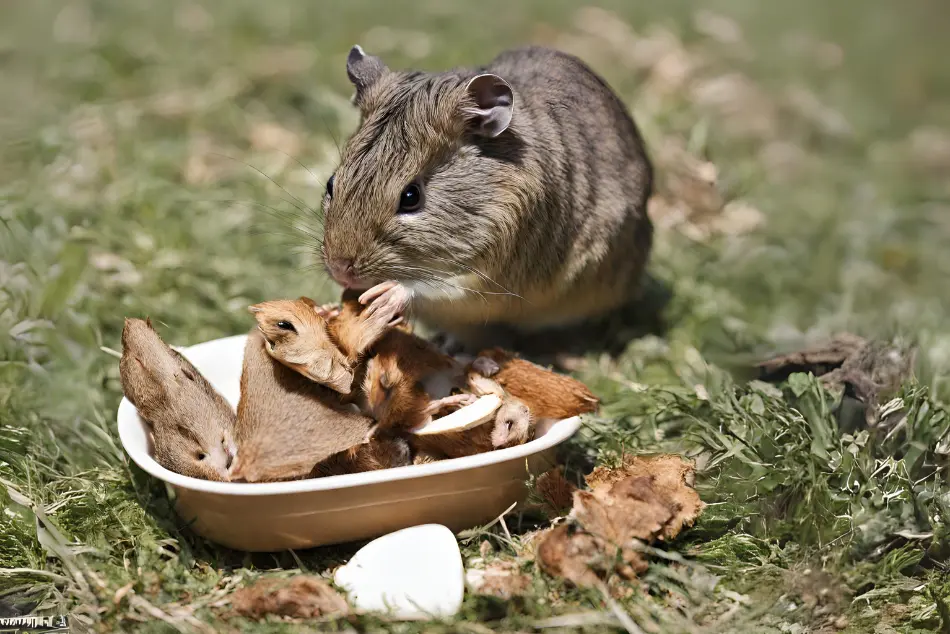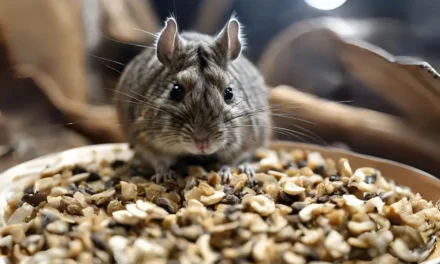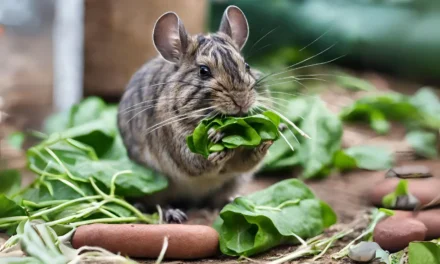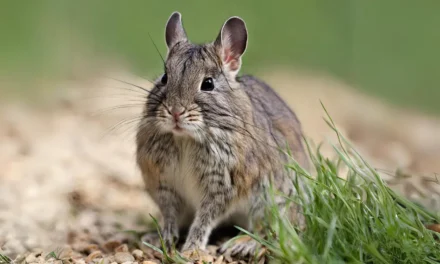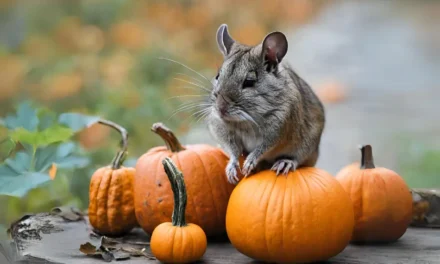Can Degu eat guinea pig food? Find out here what’s safe for them and how to ensure their well-being!
Have you ever found yourself staring at those adorable little faces of your pets, wondering if they can share meals? If you’re a pet enthusiast with degus and guinea pigs, your curiosity about their dietary compatibility might have struck you.
It’s essential to ensure our furry friends’ diets suit their needs. Here, we’ll explore the dietary requirements of degus and guinea pigs, understand the key differences, and provide insights into whether sharing a meal plan is feasible for these adorable creatures.
To embark on this quest for nutritional harmony, let’s break down the specifics and understand the dietary habits of degus and guinea pigs. But before delving into this, let’s consider a real-life example that sheds light on the unique dietary needs of these cute little critters.
Why Guinea Pig Food Isn’t Ideal for Degus
While guinea pig food may seem like a convenient option, it’s not always suitable for degus. Here’s why:
- High Sugar Content: Guinea pig food often contains higher sugar levels, which can be detrimental to degus prone to diabetes.
- Unsuitable Ingredients: Some guinea pig foods include ingredients like dried fruit or molasses, which are high in sugar and can cause digestive issues in degus.
- Nutritional Imbalances: The nutrient profile of guinea pig food may not meet the specific needs of degus, potentially leading to deficiencies or imbalances.
Understanding Degus and Guinea Pigs: Their Dietary Needs
What Do Degus Eat?
Degus are charming little rodents with specific dietary needs. In their natural habitat, these creatures feast on hay, fresh vegetables, and a small amount of high-quality pellets.
Their digestive systems are delicate, and they require a diet high in fiber to maintain optimal health.
What do Guinea Pig Food Eat
Guinea pigs, on the other hand, have their dietary requirements. They thrive on a diet comprising hay, fresh vegetables, and specially formulated guinea pig pellets. These pellets are tailored to meet their nutritional needs, packed with vitamin C and other essential nutrients. But here’s where it gets intriguing.
Nutritional Differences Between Degu and Guinea Pig
| Aspect | Degu Diet | Guinea Pig Diet |
| Hay | High-quality grass hay (timothy hay, meadow hay) | Unlimited access to high-fiber hay (timothy hay, orchard grass) |
| Pellets | Degu-specific pellets, low in sugar and fat | Guinea Pig pellets, fortified with Vitamin C |
| Fresh Vegetables | Limited amounts of fresh vegetables (e.g., kale, celery, carrots) | Daily servings of fresh vegetables (e.g., bell peppers, leafy greens) |
| Fruits | Occasional small amounts of fruits (e.g., apple, pear) | Occasional small amounts of fruits (e.g., apple, melon) |
| Protein | Limited protein sources (e.g., hay, alfalfa pellets) | Adequate amounts of hay, limited protein pellets, and occasional alfalfa hay for younger pigs |
| Vitamin C | Not as essential as for Guinea Pigs, but may be provided through veggies | Essential; provide through fresh vegetables or supplements if needed |
| Treats | Occasional treats like sunflower seeds or nuts | Limited treats; avoid sugary or fatty treats |
| Water | Fresh, clean water available at all times | Fresh, clean water available at all times |
| Mineral Chews | Provide mineral chews for dental health | Provide mineral chews for dental health |
| Supplements | Limited need for supplements unless advised by a vet | Vitamin C supplement if not obtained through diet |
Guinea pig companionship by chinchillas and degus?
Guinea pigs, chinchillas, and degus are all social animals that thrive on companionship, but it’s essential to understand their specific needs and behaviors to determine if they can be housed together. Here’s some information about each species:
Guinea Pigs:
- Guinea pigs are highly social animals and generally thrive when kept in pairs or groups.
- They prefer the company of other guinea pigs, as they communicate through vocalizations, grooming, and other social behaviors.
- It’s not recommended to house guinea pigs with chinchillas or degus due to differences in their social structures and communication methods.
Chinchillas:
- Chinchillas are also social animals and usually do well when kept with another chinchilla of the same sex.
- Introducing a guinea pig to a chinchilla or vice versa is not advisable, as they have different communication styles and social behaviors. This could lead to stress and potential conflicts.
Degus:
- Degus are social rodents that live in colonies in the wild.
- Similar to chinchillas, degus may not communicate effectively with guinea pigs, and there is a risk of stress or aggression if they are housed together.
It’s crucial to consider the following factors when determining suitable companions for these animals:
- Size and Strength: Guinea pigs are generally larger than chinchillas and degus, which could lead to accidental injuries if they are housed together.
- Communication: Each species has its own way of communicating, and misinterpretations can lead to stress or aggression.
- Health Concerns: Different species may have different dietary and environmental requirements, and housing them together could impact their overall health.
Why can’t degus eat chinchilla food?
While chinchilla food and degu food may seem similar, there are specific nutritional differences between the two that make it important to feed each species the appropriate diet. Degus have unique dietary requirements, and feeding them chinchilla food may not meet their nutritional needs adequately. Here are some reasons why degus shouldn’t eat chinchilla food:
- Nutritional Content: Chinchillas and degus have different nutritional requirements. Degus, for example, need a diet that is lower in calcium and higher in fiber compared to chinchillas. Chinchilla food may not provide the optimal balance of nutrients required for the health of degus.
- Sugar Content: Degus are prone to developing diabetes, and their diet should be low in sugar to prevent health issues. Some chinchilla foods may contain ingredients that are higher in sugar, which is not suitable for degus.
- Fiber Levels: Degus have a unique digestive system that requires a high-fiber diet to maintain proper gut health. Chinchilla food may not provide the specific fiber levels needed for degus.
- Pellet Size and Shape: The size and shape of the pellets in chinchilla food may not be suitable for degus. The dental health of degus can be affected if they are not provided with food that encourages proper chewing.
- Vitamin and Mineral Composition: The vitamin and mineral requirements can vary between species. Feeding degus a chinchilla-specific diet may lead to imbalances and deficiencies in certain nutrients crucial for their well-being.
Understanding Degus’ Nutritional Needs
Degus thrives on a diet rich in hay, fresh veggies, and quality pellets. However, the key lies in balancing these elements to meet their specific nutritional requirements. While hay and veggies are staples, carefully selecting pellets ensures they receive the necessary nutrients.
Guinea Pig Food: Analyzing the Composition
Guinea pig food is tailored to meet their specific dietary needs, emphasizing higher levels of vitamin C. Exploring the components of this food helps us understand why it might not align with the nutritional needs of degus.
Potential Risks: Degus Eating Guinea Pig Food
Feeding degus guinea pig food may lead to nutritional imbalances. Identifying the risks associated with offering this food to degus is crucial, ensuring their well-being isn’t compromised.
Optimal Diet for Degus: Tailoring Their Meals
Crafting a diet suitable for degus involves understanding their nutritional needs. Exploring alternative food options and tweaking their meal plans ensures they receive a balanced and fulfilling diet.
The Symptoms, Diagnosis, and the Treatment of Degu Can Eat Guinea Pig Food
Symptoms:
- Loss of appetite
- Weight loss
- Reduced activity level
- Changes in feces (diarrhea or constipation)
- Dental problems (overgrown teeth)
- Dull coat or fur loss
- Weakness or lethargy
Diagnosis:
- Physical examination
- Review of diet history
- Blood tests for nutritional deficiencies
- Dental examination for signs of malocclusion (overgrown teeth)
- X-rays to assess dental or gastrointestinal issues
Treatment:
- Dietary modification to provide proper nutrition
- Potential supplementation with specific nutrients (calcium, vitamin D, etc.)
- Dental trimming or filing for overgrown teeth
- Encouraging exercise and mental stimulation
- Regular veterinary check-ups to monitor progress
- Addressing any underlying health issues or complications
As a veterinary specialist, always consult a veterinarian for specific guidance tailored to your degus individual needs.
Pros of Degus Eat Guinea Pig Food
- Social and interactive pets
- Intelligent and can be trained
- Generally hardy and resilient
- Form strong bonds with their owners
- Enjoy engaging in playful behaviors
Cons Degus Eat Guinea Pig Food
- Prone to dental issues
- Require a specific diet and nutritional balance
- Need ample space and exercise opportunities
- Can be territorial and aggressive
- Social animals may suffer if kept alone
Related Topics:
FAQs about Can degu eat guinea pig food
Can Degus eat rat food?
No, rat food doesn’t typically provide the specific nutritional requirements that degus needs.
Do degus eat hay?
Yes, hay is essential to a degus diet, providing fiber for digestion and dental health.
Can degus eat chinchilla food?
Yes, chinchilla food can be a suitable alternative for degus due to similarities in their dietary needs.
What do degus eat in the wild?
In the wild, degus primarily consume grasses, seeds, and vegetation found in their natural habitat.
What vegetables can degus eat?
Degus can eat various vegetables like kale, broccoli, bell peppers, and carrots in moderation.
Can degus eat mealworms?
In small quantities, mealworms can be offered occasionally as a treat but shouldn’t be a staple in their diet.
Can Degus eat rabbit food?
Rabbit food may provide a different nutritional balance than degus requires and might not be suitable as their primary diet.
Can degus eat carrots?
Yes, carrots can be given as an occasional treat, but they should not be the primary vegetable in a degus diet due to their sugar content.

